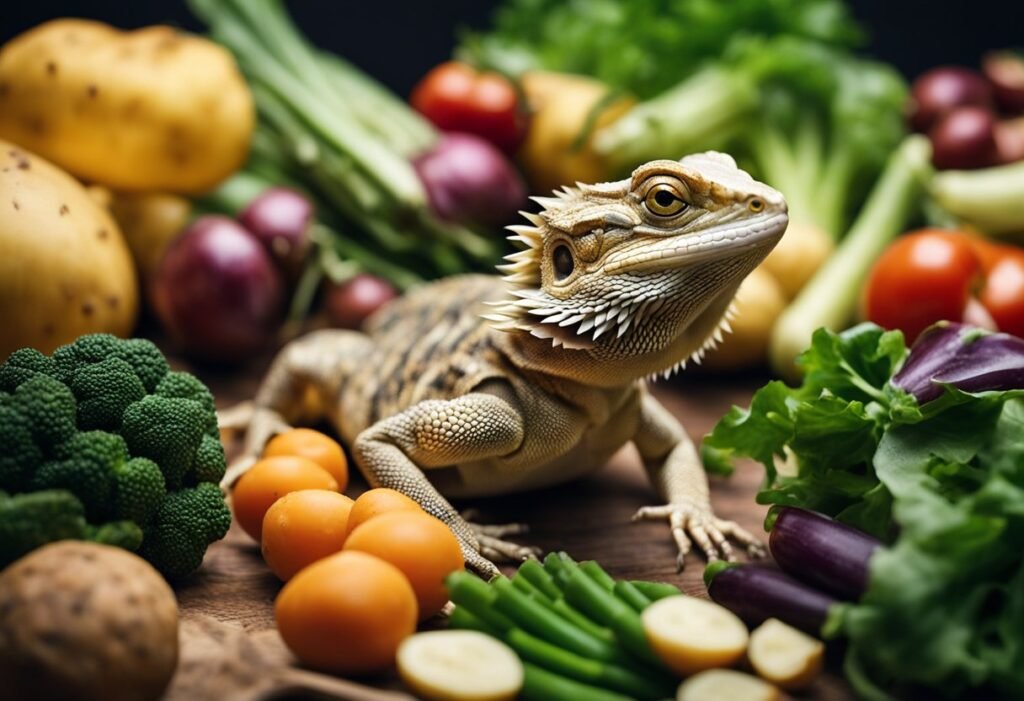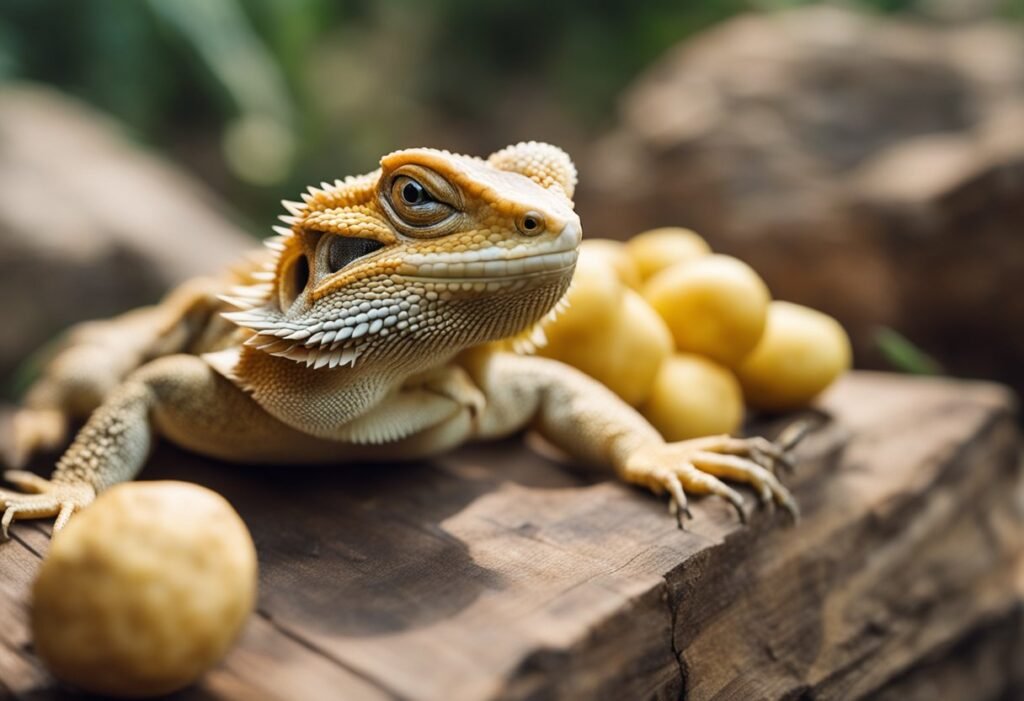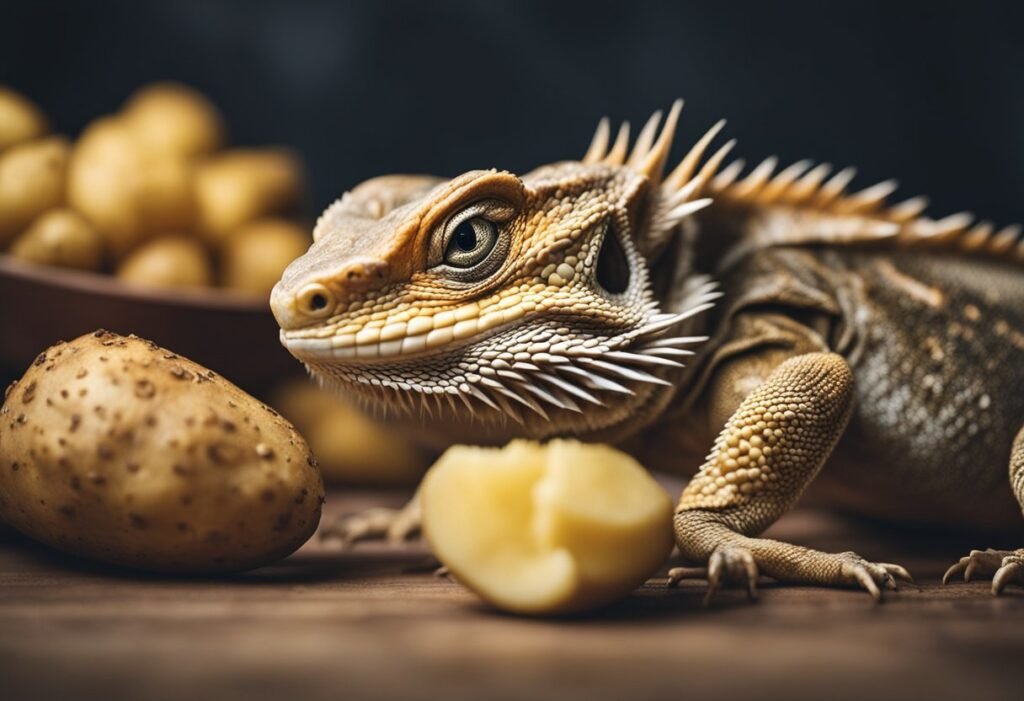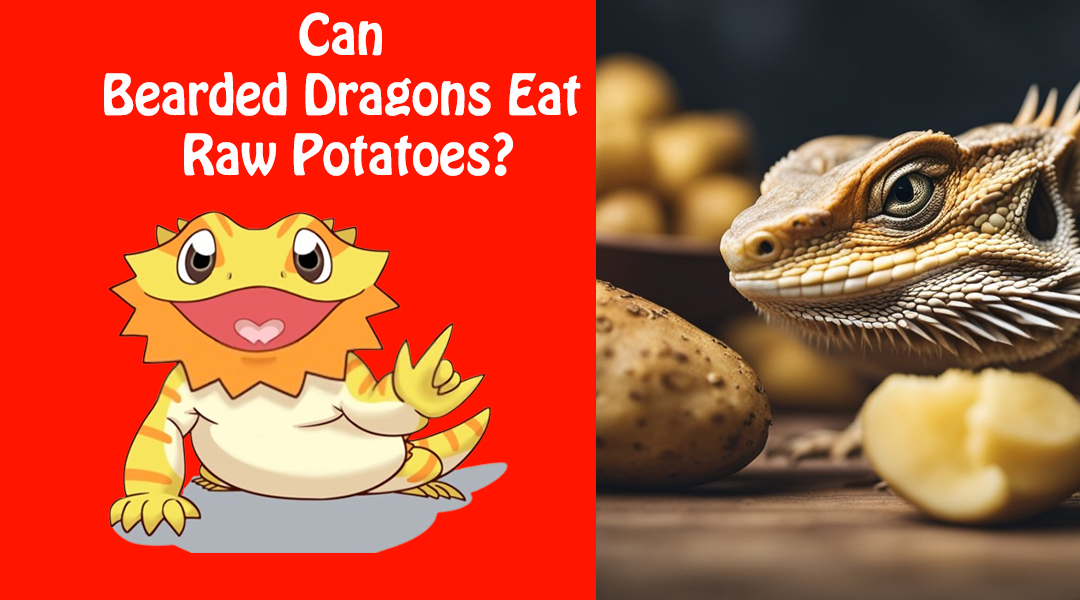Bearded dragons are known for their diverse diet, but as owners, it’s crucial to know what foods are safe for them to consume. One common question that arises is whether bearded dragons can eat raw potatoes. In this article, we will explore the topic in detail and provide a clear answer.
Firstly, it’s important to note that bearded dragons are omnivores and require a balanced diet of both plant and animal matter. While they can eat a variety of fruits and vegetables, not all are safe for them to consume. Raw potatoes, in particular, are a controversial food item, and there are differing opinions on whether they are safe for bearded dragons to eat.
In the following paragraphs, we will delve deeper into the nutritional value of raw potatoes and the potential risks associated with feeding them to bearded dragons. By the end of this article, you will have a clear understanding of whether or not raw potatoes should be included in your bearded dragon’s diet.
Bearded Dragon Dietary Basics

As responsible pet owners, we must ensure that our bearded dragons receive a balanced diet that meets their nutritional needs. In the wild, bearded dragons are omnivores and consume a variety of insects, vegetables, and fruits. Therefore, it is essential to provide them with a similar diet in captivity.
Here are some dietary basics that we need to keep in mind while feeding our bearded dragons:
- Protein: Bearded dragons require a high protein diet, and insects such as crickets, mealworms, and dubia roaches are excellent sources of protein. We recommend feeding insects that are no larger than the space between the bearded dragon’s eyes to prevent choking.
- Vegetables and Fruits: Bearded dragons need a variety of vegetables and fruits to supplement their protein intake. Some excellent options include collard greens, kale, carrots, and squash. Fruits such as blueberries, raspberries, and mangoes can also be given as treats in moderation.
- Calcium and Vitamin D3: Bearded dragons require calcium and vitamin D3 to maintain healthy bones and prevent metabolic bone disease. We recommend dusting their food with a calcium and vitamin D3 supplement at least twice a week.
It is important to note that bearded dragons should not be fed certain foods, including avocado, rhubarb, and spinach, as they can be toxic. Additionally, raw potatoes should not be given to bearded dragons as they contain solanine, a toxic compound that can cause digestive issues and even death.
By following these dietary basics, we can ensure that our bearded dragons receive a balanced and nutritious diet that promotes their health and wellbeing.
The Risks of Feeding Raw Potatoes to Bearded Dragons

When it comes to feeding our bearded dragons, it’s important to be aware of what foods are safe and which ones are not. Raw potatoes are one food item that should be avoided due to the potential risks they pose to our reptilian friends.
Solanine Toxicity
Potatoes contain solanine, a toxic compound that can cause a range of symptoms in bearded dragons if consumed in large amounts. These symptoms include vomiting, diarrhea, lethargy, and even death in severe cases. While the solanine levels in raw potatoes are generally low, it’s still not worth the risk to feed them to your bearded dragon.
Digestive Issues
Raw potatoes are also difficult for bearded dragons to digest. They contain a high amount of starch, which can be hard on their digestive system. This can lead to digestive issues such as bloating, constipation, and diarrhea. In addition, the skin of raw potatoes can be tough to digest and may cause irritation or inflammation in the digestive tract.
Nutritional Imbalance
Feeding raw potatoes to your bearded dragon can also lead to a nutritional imbalance. Potatoes are high in carbohydrates but low in other essential nutrients such as protein, calcium, and vitamins. This can cause your bearded dragon to become malnourished if they are fed a diet that is too high in potatoes or other starchy vegetables.
In conclusion, it’s best to avoid feeding raw potatoes to your bearded dragon due to the potential risks they pose. Stick to feeding them a balanced diet of fresh greens, vegetables, and insects to ensure they stay healthy and happy.
Safe Foods for Bearded Dragons
When it comes to feeding your bearded dragon, it’s important to know what foods are safe and healthy for them to eat. Here are some safe options to consider:
Vegetables and Greens
Bearded dragons require a diet that is high in vegetables and greens. Some safe options include:
- Collard greens
- Mustard greens
- Kale
- Turnip greens
- Dandelion greens
- Endive
- Escarole
- Squash
- Carrots
- Bell peppers
- Cucumber
- Zucchini
It’s important to note that while some vegetables and greens may be safe for your bearded dragon to eat, others may not be. For example, spinach and rhubarb are high in oxalates which can bind to calcium and prevent its absorption. As a result, it’s best to avoid feeding your bearded dragon these foods.
Fruits
While fruits should not make up the majority of your bearded dragon’s diet, they can be a healthy addition in moderation. Some safe options include:
- Apples
- Blueberries
- Strawberries
- Mangoes
- Papayas
- Grapes
- Melons
- Peaches
It’s important to note that fruits are high in sugar, so it’s important to feed them in moderation.
Insects and Proteins
Insects and proteins should make up a small portion of your bearded dragon’s diet. Some safe options include:
- Crickets
- Dubia roaches
- Mealworms
- Superworms
- Hornworms
- Silkworms
- Pinky mice (for adult bearded dragons only)
It’s important to note that insects should be gut-loaded (fed a nutritious diet) and dusted with calcium powder before being fed to your bearded dragon.
In conclusion, it’s important to provide your bearded dragon with a balanced and varied diet that includes a variety of safe vegetables, fruits, and proteins. By doing so, you can help ensure that your bearded dragon stays healthy and happy.
Preparing a Balanced Diet for Bearded Dragons

As responsible pet owners, it is essential to provide our bearded dragons with a well-balanced diet that meets their nutritional needs. A balanced diet for bearded dragons should consist of a variety of foods that provide them with the necessary nutrients, vitamins, and minerals.
We recommend feeding your bearded dragon a diet that consists of 80% vegetables and 20% insects. Vegetables should be the primary source of food, and insects should be fed as a supplement.
When selecting vegetables for your bearded dragon, it is important to choose a variety of leafy greens, such as collard greens, kale, and mustard greens. Vegetables that are high in beta-carotene, such as carrots and sweet potatoes, are also a great addition to their diet.
Insects should be fed in moderation, and you should avoid feeding them wild-caught insects. Some of the best insects to feed your bearded dragon include crickets, mealworms, and dubia roaches.
It is important to note that some foods are toxic to bearded dragons and should be avoided. Foods such as avocado, rhubarb, and spinach contain oxalic acid, which can bind to calcium and prevent its absorption. Raw potatoes should also be avoided as they contain solanine, which is toxic to bearded dragons.
In conclusion, a balanced diet for bearded dragons should consist of a variety of vegetables and insects. We should avoid feeding them toxic foods and ensure that they receive the necessary nutrients, vitamins, and minerals to maintain their health and wellbeing.
Alternative Treats to Raw Potatoes
If you’re looking for some alternative treats to feed your bearded dragon, there are plenty of safe and healthy options to choose from. Here are some of our favorites:
Safe Vegetable Treats
Vegetables are an important part of a bearded dragon’s diet, and there are many options that can be fed as treats. Some safe vegetables to consider include:
- Carrots
- Squash
- Bell peppers
- Green beans
- Collard greens
- Mustard greens
- Turnip greens
- Endive
- Escarole
Make sure to wash all vegetables thoroughly before feeding them to your dragon. It’s also important to chop them into small pieces to make them easier to eat.
Occasional Fruit Treats
While fruit should not make up a large part of a bearded dragon’s diet, it can be offered as an occasional treat. Some safe fruits to consider include:
- Apples
- Blueberries
- Grapes
- Mango
- Papaya
- Strawberries
- Watermelon
It’s important to remember that fruit should only be fed in moderation, as it is high in sugar. Too much fruit can lead to health problems such as obesity and diabetes.
Overall, there are many safe and healthy treats that you can offer your bearded dragon. By providing a varied diet that includes a mix of vegetables and occasional fruits, you can help keep your dragon healthy and happy.
Monitoring Your Bearded Dragon’s Health

As responsible bearded dragon owners, we need to monitor our pets’ health regularly. Here are some tips to help you keep your bearded dragon healthy and happy:
1. Regular Vet Check-Ups
It’s essential to take your bearded dragon to a reptile veterinarian for regular check-ups. A vet can help identify any health issues early on and provide treatment if necessary. We recommend scheduling a check-up at least once a year.
2. Observe Eating Habits
Bearded dragons are naturally voracious eaters, but a sudden loss of appetite can indicate an underlying health issue. We should monitor our pet’s eating habits and make sure they are consuming enough food. If you notice any changes in appetite, it’s best to consult a vet.
3. Monitor Weight
Bearded dragons should maintain a healthy weight, and sudden weight loss or gain can indicate a health issue. We recommend weighing your pet regularly and keeping track of any changes.
4. Check for Signs of Illness
We should regularly check our bearded dragons for any signs of illness, such as lethargy, diarrhea, or abnormal behavior. If you notice any concerning symptoms, it’s best to consult a vet.
5. Provide Proper Diet and Environment
A healthy diet and environment are crucial for a bearded dragon’s well-being. We should ensure that our pet’s diet includes a variety of vegetables, fruits, and insects. Additionally, we should provide a suitable habitat with proper lighting, temperature, and humidity levels.
By following these tips, we can help ensure that our bearded dragons stay healthy and happy.
Frequently Asked Questions
Are raw potatoes safe for bearded dragons to consume?
No, raw potatoes are not safe for bearded dragons to consume. Raw potatoes contain solanine, which is toxic to bearded dragons and can lead to digestive problems, vomiting, and diarrhea. It is important to always feed your bearded dragon fresh and safe foods.
What vegetables should be avoided in a bearded dragon’s diet?
Bearded dragons should avoid vegetables that are high in oxalates, such as spinach and beet greens, as well as vegetables that are high in goitrogens, such as kale and broccoli. These substances can interfere with calcium absorption and thyroid function in bearded dragons.
Can bearded dragons have cooked vegetables, such as sweet potatoes?
Yes, bearded dragons can have cooked vegetables, such as sweet potatoes, as long as they are prepared without any added oils or seasonings. Cooked vegetables are easier for bearded dragons to digest and can provide them with important nutrients.
What fruits are suitable for bearded dragons to eat regularly?
Bearded dragons can eat a variety of fruits, including apples, bananas, berries, and melons. However, fruits should be fed in moderation as they are high in sugar and can lead to obesity and other health issues if overconsumed.
Is it safe for bearded dragons to eat eggs, and if so, how often?
Yes, bearded dragons can eat eggs as a source of protein. However, eggs should be fed in moderation and should be cooked thoroughly to avoid the risk of salmonella. It is recommended to feed eggs to bearded dragons no more than once a week.
Are there any risks associated with feeding bearded dragons onions or tomatoes?
Yes, onions and tomatoes should be avoided in a bearded dragon’s diet as they can be toxic and cause digestive issues. Onions contain compounds that can damage a bearded dragon’s red blood cells, while tomatoes contain high levels of oxalates that can interfere with calcium absorption.
I, Mark Antonelli am highly interested in pet care tips. The experiences I gained through university life in animal sciences were also helpful to identify the best tricks for caring for and feeding varying kinds of pets. I know the majority of people love to own a pet. Yet, there is a guilty of owing a Bearded Dragon due to a lack of information about how much friendly and peaceful they are. I thought of filling this gap with detailed writings about this Pogona genus Bearded Dragon. All my team is also giving me great support to fulfil my mission. Hope you will enjoy the journey with us.

